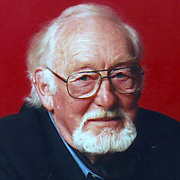
Bernard Kearns
Bernard Kearns was visiting Melbourne when he was told his bass voice would work well on radio. Within three weeks Kearns had scored a job: Morris West (later one of Australia’s most successful novelists) was looking for an unknown actor with a bass voice to play Jesus Christ, in a 39-episode adaptation of the New Testament.
“I knew nothing about radio acting," said Kearns, "and he took me on.” The exclusive contract saw him writing material as well. After Kearns got married, the couple returned home to New Zealand. On the radio he produced and acted in plays, and conducted interviews. Kearns had begun acting, even before his Australian radio break; producing and acting for the Canterbury Student Players, and performing for The New Zealand Players.
That rich, authoritative voice would be heard over at least five decades. On screen, he narrated a run of National Film Unit shorts (including Oscar-nominated Antarctic documentary One Hundred and Forty Days Under the World), the offbeat Dominant Species, and a 1981 documentary on the Erebus disaster. When live coverage aired of what would soon be called Waitangi Day, Kearns was co-host, alongside Bill Kerekere.
In 1972 the NZ Broadcasting Corporation switched Kearns from radio to television. “I knew nothing about it. I didn’t even own a bloody television. They called me a script editor, but they couldn't tell me what a script editor did." A pile of correspondence and articles from the BBC landed on his desk, in the hope it might help. Kearns worked on comedy Buck House and the second series of landmark local drama Pukemanu.
Kearns made his on screen debut in 1971 NFU short Rutherford of Nelson, in a brief appearance as Rutherford's lecturer Alexander Bickerton. In 1973 he appeared on television as presenter of 13-part history series The Years Back.
In 1976 Kearns left the Drama Department for an extended stint in Religious Programmes. Kearns did everything from research to directing, and was a reporter on the long-running People Like Us. His extended piece to camera near the opening of this episode on Apirana Mahuika would have left many of his colleagues wishing they had acting experience too. His "pet show" was Offerings, a short interview slot which screened on Sunday nights.
Kearns' interest in religion was paralleled by some of his screen acting roles — he played men of the cloth in Ian Cross classic The God Boy, children's short Blackhearted Barney Blackfoot and The Enid Blyton Secret Series.
"I never really considered I was any good on screen", Kearns was once heard to say. Casting agents disagreed. He spent a month in the Cook Islands playing "the only Palangi" in movie The Silent One, but was likely recognised by more Kiwis for 1977 movie Sleeping Dogs; his role as Prime Minister of a totalitarian New Zealand (seen in this excerpt) required only a day's work. He was also seen in one-off dramas The Pumice Land and Old Man's Story (which he helped adapt).
His final roles included quirky Margaret Mahy primer A Tall Long Faced Tale in 2008, and a cameo as father to Ivanhoe in locally shot series Dark Knight. Among the few screen performances he felt satisfied with was The God Boy, and a guest role as a murder suspect on police drama Shark in the Park.
Back in 1958, Kearns had narrated the debut production of James K Baxter's radio play Jack Winter's Dream. In 1979 David Sims adapted the play for this hour-long film, and cast Kearns to play barman Webfoot Charlie. "He performed with distinction," recalls Sims.
Bernard Kearns passed away on 21 March 2017. He was 92.
Sources include
Bernard Kearns
David Sims
'Bernard Kearns' - The Press, 25 March 2017
Diana Ward, 'Jack Winter's Dream' - Art New Zealand, Summer 1979
'University of Canterbury Drama Society :[Programmes and ephemera .1926, 1940-1970s]' National Library of New Zealand website (Broken link). Accessed 30 March 2017 (Reference: Eph-A-DRAMA-UCDS-1920/1979)